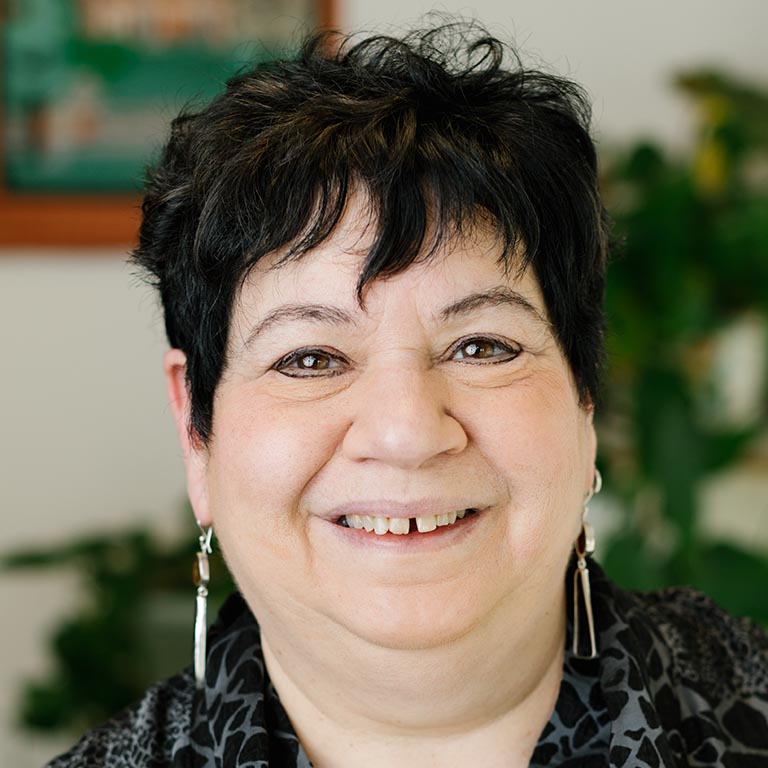- Ph.D., University of Pennsylvania, 1987
- M.A., University of Pennsylvania, 1983
- B.A., Memorial University of Newfoundland, 1979

Diane Goldstein
Professor Emerita, Folklore and Ethnomusicology
she/her

Professor Emerita, Folklore and Ethnomusicology
she/her
“If it’s bleak, I will study it.” This is what my colleague Diane Goldstein says when she introduces herself to a new cohort of graduate students. Over the course of her career, Diane has brilliantly applied a folkloristic approach to the study of some of the darker aspects of life: stigmatized illnesses, especially HIV/AIDS; maternal infanticide; sexual assault; trauma; disaster response; fake news; untellable narratives. To each of these subjects Diane brings compassion and deep understanding of the nature of individual action and societal reaction.
Born in New York City, raised in Philadelphia, with a year spent in Scotland behind her, Diane moved to Newfoundland, Canada, when she was seventeen years old. She was brought up in a house filled with books and folk music: her father was the record-producer and famous folklorist Kenneth S. Goldstein. Yet, Diane forged a unique path into their shared discipline, and she has had considerable impact on the study of folklore and its scholarly society.
A Bachelor’s degree in Comparative Religion from Memorial University in Newfoundland helped to shape a deep interest in folk religion and folk medicine, which led Diane to pursue her M.A. and Ph.D. degrees in Folklore at the University of Pennsylvania, returning her to the city of her childhood. This academic training poised her perfectly for the dedicated work on the intersection of vernacular and institutional discourses as they pertain to health, public policy, education, and the law.
In 1986, Diane began teaching in the Department of Folklore at the Memorial University of Newfoundland, where she served a stint as Chair. At Memorial, Diane also held an appointment as Professor of Community Medicine in the School of Medicine, Division of Community Health and Medical Humanities, a position she retains today. In 2009, Diane was named University Research Professor, the highest distinguished faculty rank at Memorial University. In 2010, she came to Indiana University, and within two years, Diane became the Chair of the Department of Folklore and Ethnomusicology, and the Director of the Folklore Institute.
In addition to serving as Chair of the two most important folklore departments in North America, Diane has also made significant contributions to the field, most notably through her service to professional academic societies. Diane was elected President of both the International Society of Contemporary Legend Research and the American Folklore Society, and she remains active in both organizations. She has also served on the editorial boards of academic journals in five countries. Her dedication and expertise have widened beyond the academy into applied and public policy arenas, where she has passionately argued for the inclusion of lay perspective and knowledge in official health and policy-making initiatives.
Diane’s loyalty to the discipline and her professional accomplishments have been richly acknowledged. A recipient of teaching awards from both Memorial University and Indiana University, Diane has also received honors from the American Folklore Society, most notably induction into the Fellows, an honorary body of distinguished scholars selected for their lifetime of outstanding contributions to the field. In 2019, Diane received the Linda Dégh Lifetime Achievement Award of the International Society of Contemporary Legend Research, given to a living senior scholar who has made significant contributions to legend scholarship. The award showcases Diane’s exemplary contribution to the study of contemporary legend through her work with international health commissions and advisory boards, and her tireless mentoring of former and current students, many having become excellent scholars in their own right.
Diane’s most permanent contribution to the study of legend — and to the study of folklore in general — is through her lectures and publications. She has given over sixty major lectures throughout the world and authored forty-five articles and book chapters. Diane’s scholarly contributions also include journal and book volumes exploring the difficult topics of legends and disaster, traumatic narratives, and supernatural legends.
The most celebrated of Diane’s books is Once Upon A Virus: AIDS Legends and Vernacular Risk Perception. This volume masterfully examines the ways in which rumors and legends about a disease influence individual and group behavior as well as legal policy. The stories reveal deep fears about contamination, and tendencies towards stereotyping and scapegoating, arising out of a lack of knowledge and extreme anxiety. Diane’s powerful conclusions argue for the importance of vernacular knowledge in understanding what illness means to people, and describe how education, health, and legal responses can be adjusted to the disease and its official discourse. Though the book was published in 2004 and focuses on another deadly virus, Diane’s message remains relevant and important today in our dealing with the Coronavirus. By utilizing the angle of folklore scholarship, we acquire a crucial understanding of disease. We should seek more than scientific and medical knowledge; we need to seek cultural knowledge as well. Diane Goldstein’s marvelous oeuvre reveals the importance of studying unofficial expressive culture — folklore — to recognize and resolve some of society’s most pressing problems.
A splendid cook and talented maker of desserts, Diane frequently offers her house to her colleagues for social gatherings. Her comfortable home is open to her graduate students, who regularly assemble with their beloved mentor for evenings filled with food, drink, and conversation. They know — as we all do — that Diane will continue to nourish them into her retirement. In the bleak moments of academic life, Diane’s generous spirit will continue to glow brightly here in Bloomington, Indiana.
--Pravina Shukla